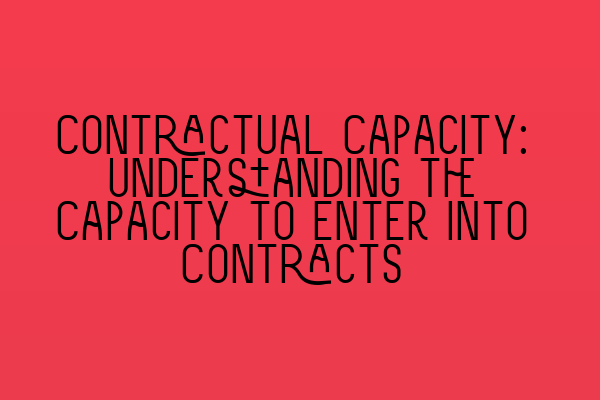Contractual Capacity: Understanding the Capacity to Enter into Contracts
When entering into a contract, it is essential to understand the concept of contractual capacity. Contractual capacity refers to the legal ability of a person or entity to enter into a binding agreement. Without the appropriate capacity, a contract may be voidable or unenforceable. In this article, we will delve deeper into the subject of contractual capacity, exploring its importance and the factors that determine whether a party has the capacity to enter into a contract.
Why is Contractual Capacity Important?
Contractual capacity serves as a fundamental principle of contract law. It ensures that parties who are mentally competent and aware can enter into contracts freely, while protecting those who may be vulnerable due to age, mental incapacity, or undue influence.
Understanding contractual capacity is crucial as it helps prevent unfair agreements and protects the interests of individuals or entities involved in a contract. By determining the capacity to enter into contracts, the law safeguards parties from being bound to obligations they may not fully comprehend or have the capacity to fulfill.
Factors Affecting Contractual Capacity
1. Age:
The age of contracting parties is a vital factor in determining their contractual capacity. Generally, minors (individuals under 18 years old) lack the legal capacity to contract, making any contract they enter into voidable. However, contracts entered into by minors for necessities such as food, clothing, and shelter are usually binding.
2. Mental Capacity:
Contractual capacity extends to the mental competence of the parties involved. Individuals who are mentally incapacitated, either due to a mental illness or intoxication, may lack the capacity to understand the nature and consequences of a contract. In such cases, a contract may be deemed voidable at the option of the incapacitated party.
3. Undue Influence:
Undue influence occurs when a party takes unfair advantage of another’s vulnerability, manipulating them into entering into a contract against their best interests. If undue influence is proven, the contract can be voidable, allowing the influenced party to seek legal remedies.
Proving Lack of Contractual Capacity
If a party wishes to argue the lack of contractual capacity, they must provide evidence to support their claim. This may involve medical reports documenting mental incapacity, expert opinions, or other substantiating evidence that demonstrates the inability to comprehend and fulfill contract obligations.
Legal Consequences of Lack of Contractual Capacity
If a person lacks the capacity to enter into a contract, certain legal consequences may arise:
1. Voidable Contracts:
If a contract involves a party lacking contractual capacity, it may be voidable at their option. They can choose to affirm or disaffirm the contract upon regaining capacity or becoming aware of their rights. Disaffirmance of a contract typically involves notifying the other party of the intent to void the agreement.
2. Restitution:
If a contract is voided due to lack of capacity, the party lacking capacity may be entitled to restitution. Restitution aims to restore the parties to their pre-contract position by reversing any unjust enrichment that may have occurred.
3. Limited Liability:
In certain situations involving minors, the law limits their liability under contracts. This means that even if a minor breaches a contract, they may be exempted from the usual consequences, such as the requirement to pay damages.
Conclusion
Contractual capacity plays a significant role in protecting parties entering into contracts. Understanding the factors that affect contractual capacity is crucial for both solicitors and individuals, as it helps identify potential risks and ensures compliance with contract law. By promoting fairness and protecting vulnerable parties, contractual capacity maintains the integrity of contractual agreements.
At SQE Contract Law, our team of solicitors ensures that clients comprehend their contractual capacity and assists in navigating the complexities of contract law. Contact us today to receive expert legal advice tailored to your specific needs.
